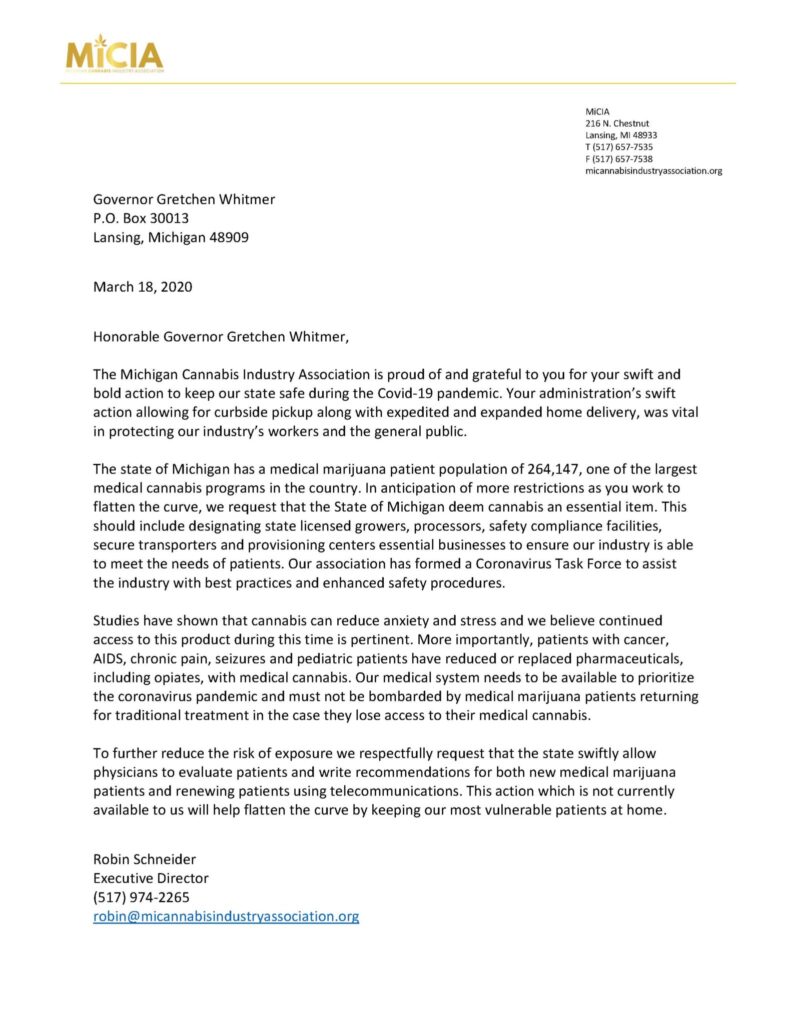I had an epiphany during Gretchen Whitmer’s notoriously strict Covid-19 lockdown. She had released a list of items, activities, and businesses deemed “essential” for the common good, along with a list of banned activities, occupations, and businesses that needed to cease operations to “save lives.”
One item deemed essential was marijuana. I found this quite bizarre, off putting, and bothersome. Small businesses across the state were forcibly closed, workers confined to their homes, and the finances of entire families were destroyed with a wave of the hand, but weed was protected.
I was struck: Weed is to the American man what vodka was to the Soviet.
That comparison fits, but it’s really much worse. Then it hit me, like a slapshot between the eyes: Weed is Aldous Huxley’s soma for the American working class and working poor.
Soma, you may recall, is a fictional narcotic, the opiate of the masses, in Huxley’s iconic novel “Brave New World.” It was a replacement for alcohol and other more deleterious vices meant to ease the pain of life. But really, it was meant to reduce societal unrest and keep the people distracted and controllable.
This essentializing of weed was a long time coming. Public opinion on weed was positive, after decades of normalization through a clever steel-manning of recreational use via a medical marijuana initiative. And now weed culture is defended with a litany of excuses, despite the obvious decay it has wrought on our state.
Anyone who uses it adopts a defensive posture and almost always reaches for the motte-and-bailey fallacy by throwing alcohol or opiates into the discussion when challenged. Any attempt to argue against weed becomes a cynical game of choosing between evils, with weed always positioned as lesser of the two. It’s weird way for the weed user to place the issue in the opponents’ hand and say, “I’m getting f***ed up no matter what, so which drug would you prefer I use?” As if the notion of abstaining isn’t an option.
I’ve witnessed this depressing trend within my own cohort of working-class Gen X men as we’ve eased into middle age. These men feel unliked, not especially valuable, blamed for most everything, and they are looking for relief. Add in that men in their 40s often have to deal with divorce, loss of health, and a shrinking social circle. An essential item such as weed can be seen as a crutch to get through the day.
The problem with using weed as a crutch is that it’s a depressant that dulls the senses and weakens the mind. Like any drug used for relief, it makes you temporarily feel good, but it doesn’t solve any root problem. A downward spiral of depression and cognitive decline through addiction is almost inevitable.
Generation X is the first age cohort to experience a high degree of marijuana normalization. It’s the first test group, so to speak. And now there is evidence from a litany of institutions, medical associations, and universities indicating that prolonged marijuana use, starting at adolescence, can lead to mental illness, cognitive decline, and psychosis.
So why was weed deemed essential by Whitmer’s Department of Health and Human Services during the Covid-19 lockdowns? Was it some ingenious and diabolical plan?
Hardly. These people aren’t that smart, and their incompetence is well documented. The answer, I suspect, is simpler and more depressing. Weed has become a way of life for many Michigan residents coping with stress, anger, depression, grievance, lack of self-worth, and anxiety. Good people who long to turn the world off. They’ve given up on raw-dogging reality and seek weed-tinted glasses. Many claim it’s to relieve pain, and they’re telling the truth. Life is filled with pain, and they don’t want to feel it anymore.
Whitmer’s health experts, haphazardly and incompetently trying to deal with a pandemic, were aware only days into the first Covid-related business closures in mid-March 2020 that confining people in their homes would be deleterious to the mentally weakest among us, and societal unrest would be likely.
The Michigan Cannabis Industry Association sent a letter to Gov. Whitmer March 18, several days before the hard lockdown mandate of March 24, that reads like a very subtle threat. It argues that, unless medical and recreational weed dispensaries aren’t allowed to remain in operation, the medical system would be “bombarded.” Furthermore, the final paragraph makes an interesting advisement to the Governor:

“To further reduce the risk of exposure we respectfully request swiftly allowing physicians to evaluate patients and write recommendations for both new medical marijuana patients and renewing patients using telecommunications.”
Translation: Michigan is an event horizon. Urgently give the people even more weed via quicker and easier access.
In addition, the letter makes mention of the prior allowances for curbside pickup, but reports the official number of cannabis patients statewide as 264,147 in the state. With about 1,000 dispensaries in the state, that breaks down to about 240 customers per business. Seems like a small number of medical marijuana card holders to keep an entire industry afloat. Furthermore, it details the dangerous stress and anxiety issues that might result if these patients are unable to buy cannabis. This seemed overdramatic and hyperbolic, but was it?
What it doesn’t overtly say—but Whitmer, the health experts, and all of us well know—is the number of weed users is way larger than a quarter million Michigan residents, and the problem for the state isn’t stressed-out cancer patients unable to get weed.
The problem was and is the vast number of mentally unwell recreational weed users. That letter was a warning from the weed lobby, very carefully reminding Gov. Whitmer that should this huddled, locked-down, and isolated mass of people be denied their “medicine,” we’d be welcoming unrest within our hospitals and quite possibly in our streets. Long story short: Weed was deemed essential to keep users placated and docile during the pandemic.
Weed is our stress reliever, our solution to our anxiety, our shield against anger and depression. It’s our essential medicine to keep restful in unrestful times.
J.Z. Delorean is a writer for Michigan Enjoyer and has been a Metro Detroit-based professional investigator for 22 years. Follow him on X @Stainless31.



